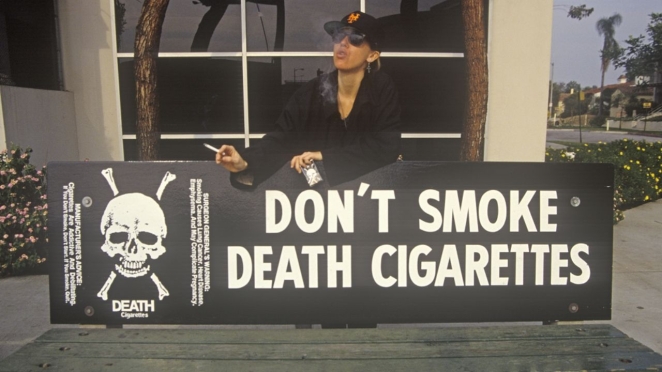With Brand Purpose back on the agenda for debate, I thought I’d finally get round to telling everyone you’re doing it wrong, using the purist’s example of a Purpose led brand to make my case. Death Cigarettes.
The term ‘Purpose’ was introduced to marketing by Mark Earls in “Welcome to the Creative Age” (2002) when he postulated (forgive me Mark, I'm going to paraphrase) that Purpose led brands maximise return on investment by concentrating on “what you want to change about the world”.
Marketing folk then interpreted Purpose as being all about doing good, aligning your brand to a marketing strategy that will make the world a better place all round. Which has left every brand manager on earth trying to force fit their brand into ever more convoluted brand missions, often distant from the sector in which they operate. Success around the adopted cause often seems to offer very little in terms of return of investment for the product they are paid to promote. The new Global CEO at unilever has spotted this.
Increasingly it seems to me Purpose has become a panacea for everyone who works in marketing to sleep a little more soundly at night, because they are making a positive contribution to the world. But Purpose is not about hitching your brand to a worthy cause (that’s called Corporate Social Responsibility). It’s about using your brand to make a change you would like to see in the world – by making your brand totally about that single-minded goal. Whether that change is for the good or not is, in fact, moot.
Which brings me to Death Cigarettes.

Back in the early 90s in the UK, a new cigarette brand launched. The makers of Death Cigarettes didn’t actually want people to smoke. What they wanted was the tobacco industry to stop pretending that its products were anything but inherently dangerous.
So they called their brand Death. Sold it in a black packet with a skull and crossbones logo. And put the following message on every packet.
'Manufacturer's advice: Cigarettes are addictive and debilitating. If you don't smoke, don't start. Death is a responsible way to market a legally available consumer product which kills people when used exactly as intended. Death cigarettes: For an honest smoke'.
They also - as every good Purpose led brand should do – delivered the brand message (Death) in everything they did. For example, when they launched a ‘Lights’ version of the brand, they called it ‘Slow Death’.
Now, we can argue about whether this ‘honest approach to marketing cigarettes’ by making smokers confront the reality of what they were doing to themselves every time they smoked, was ‘doing good’. It certainly energised the debate about cigarette advertising – for example poster companies refused to take their ads, when they had no problem taking all the other tobacco company’s ads, which always seemed a tad hypocritical to me.
But I imagine what we can all agree is that here was a brand that had gone all in behind one single minded idea, delivering a consistent brand promise that if accepted by users, would change their world. Very dramatically.
Which seems to me to be the very definition of Purpose.
And somewhere along the way - that’s been forgotten.
Purpose is not about force fitting a brand to a worthy mission or doing good in the world; it’s about single-mindedness of thought and the passionate pursuit of a society changing goal.
Go all in - and it can be highly effective; Go at it half cocked – and you’re wasting your time and the shareholders money.





Andy Carolan October 30th, 2023, in the afternoon
Interesting marketing strategy. Not at all surprised that poster companies shunned their product as it was clearly far too honest for the industry.Talking of smoking, it's worth checking out the Docuseries "The rise and fall of JUUL" on Netflix. Some 'interesting' marketing decisions were made by the team that deviated somewhat from the founder's noble goals, and with catastrophic results.